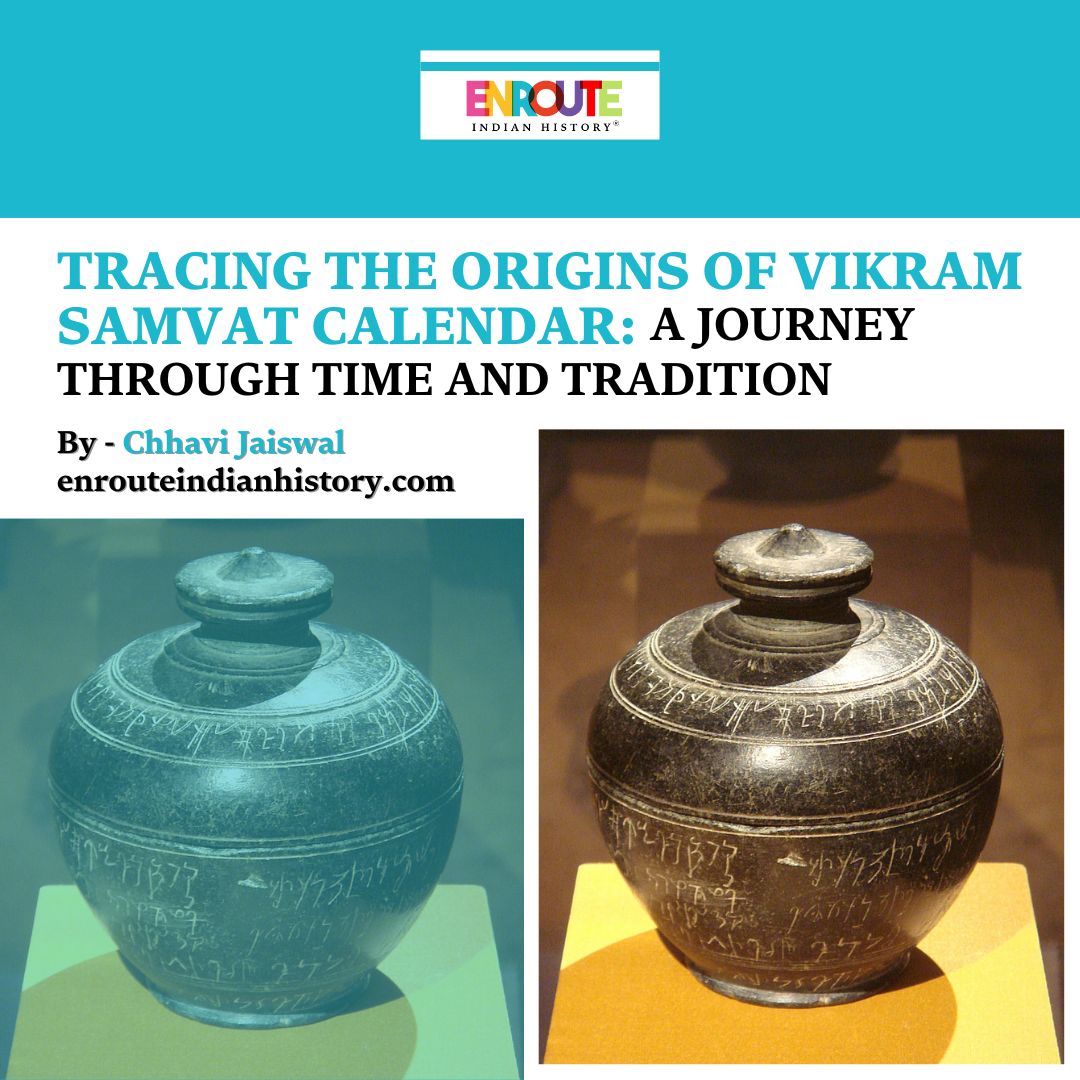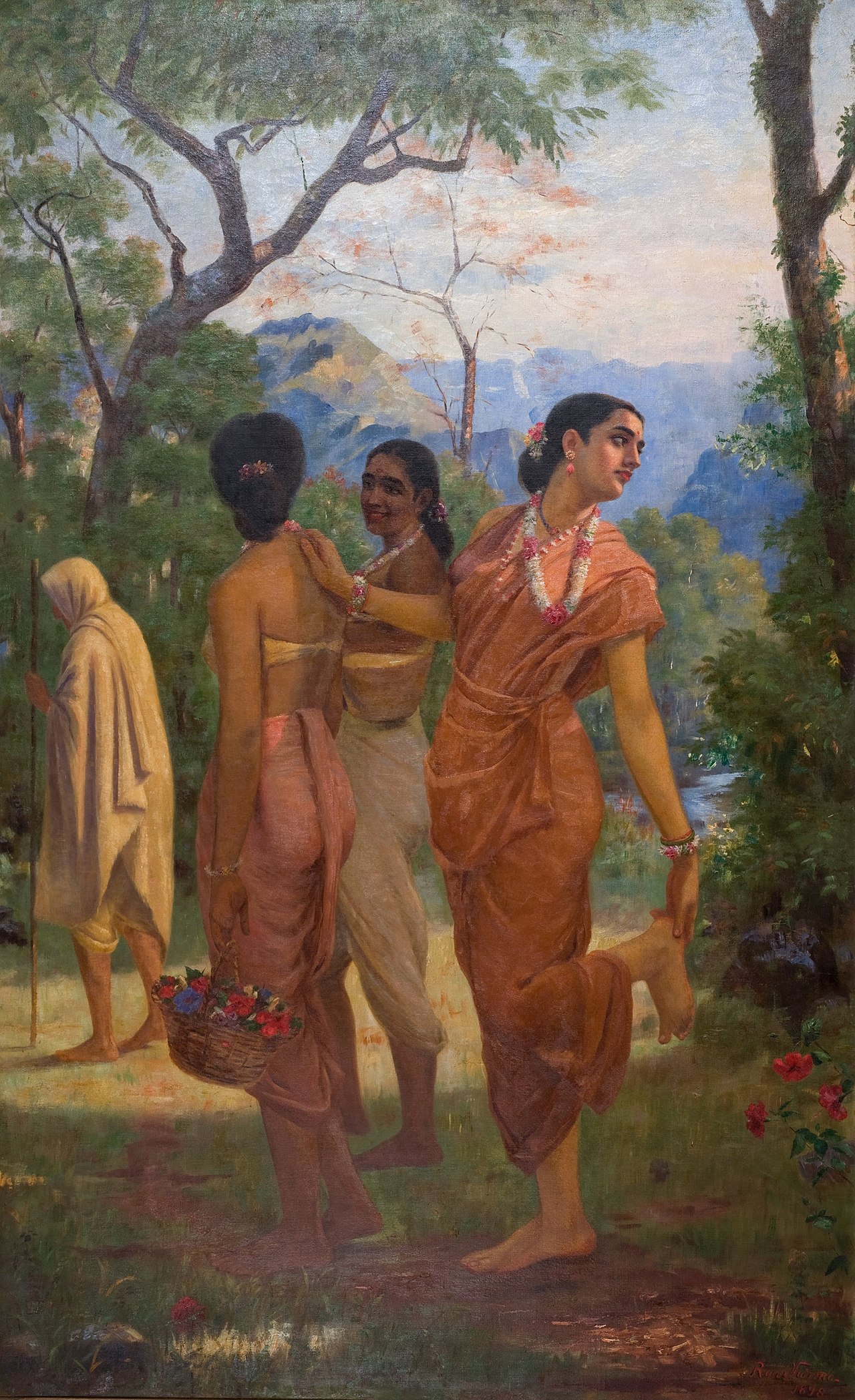Cyclical and Linear time: cross cultural exploration of temporal concepts
- enrouteI
- September 12, 2024
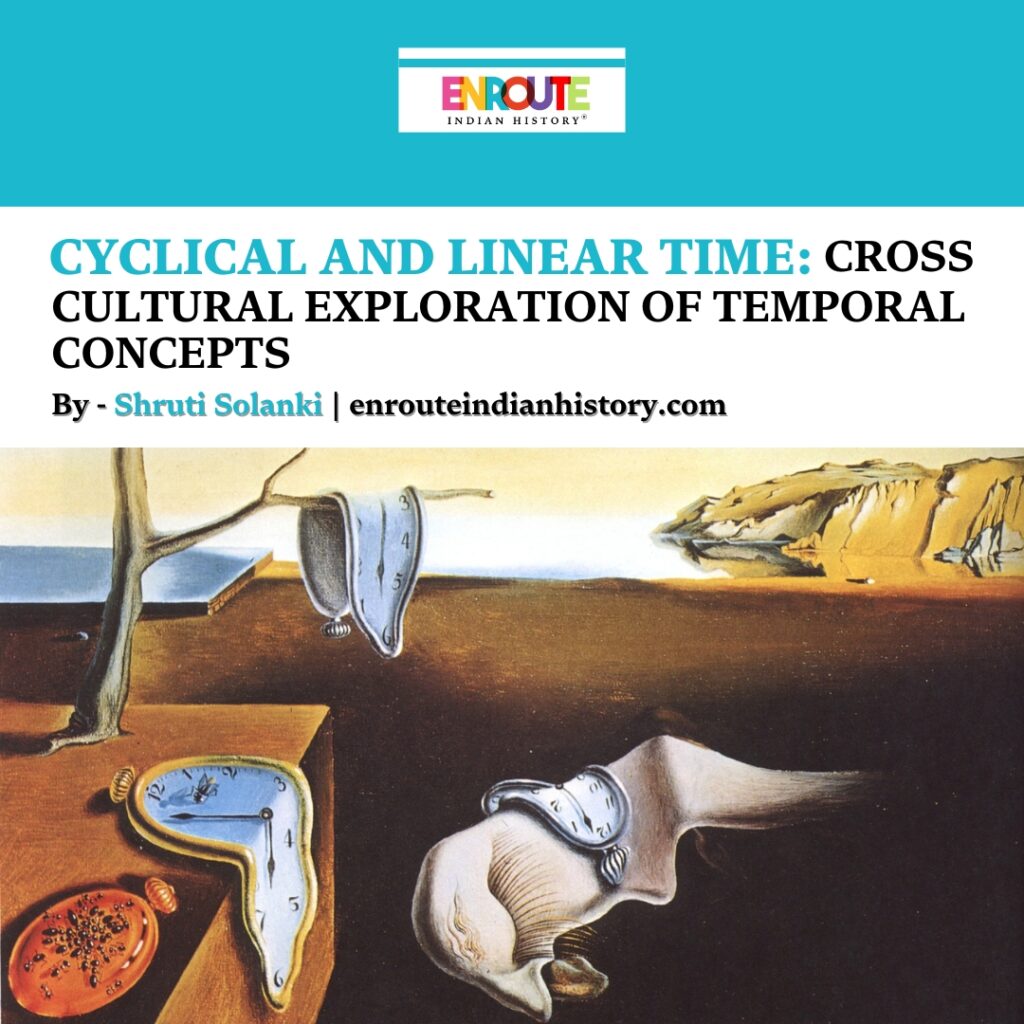
If you walked on an Indian street, you’d think everybody’s in a hurry, and yet, no one ever seems to be on time!” remarked Indian writer and politician Shashi Tharoor, speaking at the 2023 New York Jaipur Literature Festival. This statement about India’s contrasting relationship with time highlights the coexistence of urgency and timelessness in India, embodying the cyclical perception of time in Indic thought. Reflecting on a cross-cultural time perspective, we find the Western notion of time as being linear , emphasising an outlook of efficiency and progress. Tharoor’s observation reflects how the metaphysical views related to time shape everyday functioning of the societies. An appreciation of the differing views on the cyclical vs linear time concepts can enable us to develop an understanding of how both the cultures have conceptualised the temporal flow.
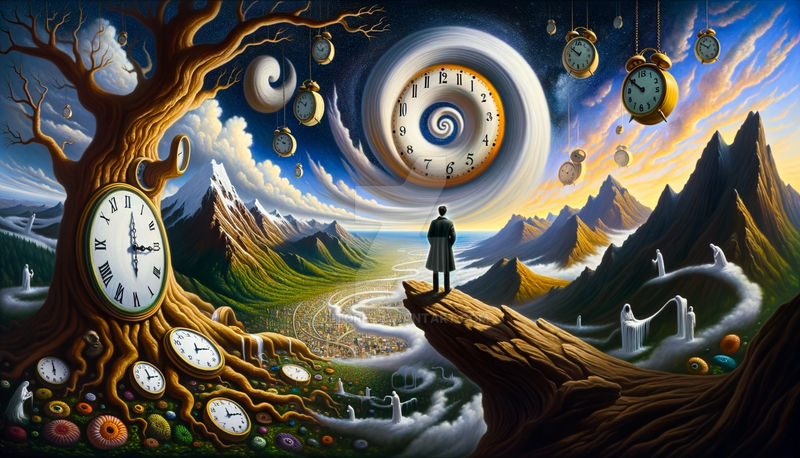
( “The persistence of memory” artwork by Salvador Dali )
Perception of time in Indian thought
In Indian philosophy, both human life and the cosmos share a cyclical nature, following the same pattern of birth, death, and rebirth. Temporal concepts in hindu mythology understand time as cyclical through the concept of yugas and kalas. Each mahayuga, or great cycle, consists of four yugas: Kritayuga, Tretayuga, Dvaparayuga, and Kaliyuga, each varying in duration. Kritayuga, the first, lasts the longest, while Kaliyuga, the current and final one, spans 432,000 years. At the end of Kaliyuga, the world is destroyed and recreated, beginning a new cycle. This cyclical view of time also reflects the belief in the transmigration of the soul so that within temporal philosophy in Hinduism, death is seen as the end of the body, not the soul, which is recycled into new forms based on one’s karma.
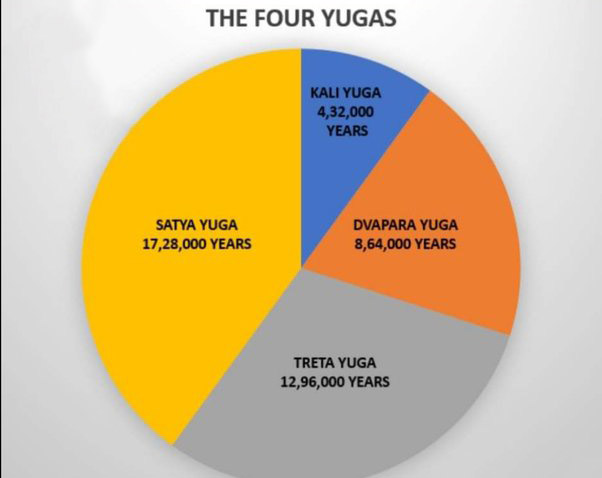
( via – www.rudraksha-ratna.com)
Cyclical time in ancient traditions is highlighted in philosophies like Advaita Vedanta and Buddhism, where phenomenal existence is governed by time (kala), and everything within time is subject to change and decay. Liberation from this temporality comes through knowledge that transcends time. Hinduism mirrors this idea with the cycles of creation by Brahma and destruction by Shiva in each mahayuga. Buddhism also embraces the cycle of birth and rebirth but emphasises that the beginning of this cycle is inconceivable, though periods of evolution and dissolution occur. In Indic thought, Time (Kala) is not only worshipped but is also seen as a force that erodes and destroys everything, marking its presence through change. Bhartrhari, a Sanskrit philosopher and grammarian, in his work Vakyapadiya, articulates that time measures activity, functioning as the instrumental cause in the creation, existence, and destruction of beings. Without change, time becomes imperceptible, reinforcing the idea that it is intrinsically linked to transformation.

( an illustration depicting cyclical nature of life , via www.baladrishti.com)
Importantly, temporal concepts in Hindu mythology do not imply an exact repetition of events but rather a recurrence of patterns and structures over different cycles. Australian historian Garry W. Trompf notes that cyclical time reflects recurring stages of development, but not necessarily the reduplication of the same events. Instead, these cycles showcase general similarities without strict, fatalistic repetition.
Temporal Insights within Christian culture
Building upon Hinduism’s perception of time as beginning-less and cyclical, this worldview starkly contrasts with how time is understood in many parts of the contemporary West, where it is primarily measured in a linear fashion, divided into seconds and hours. While Western thought, influenced by Christianity, views the universe as having a definitive starting point through God’s creation, it does not entirely dismiss cyclical divisions. Seasons and cycles are still widely accepted and integrated into the temporal flow, despite the overarching linear framework.
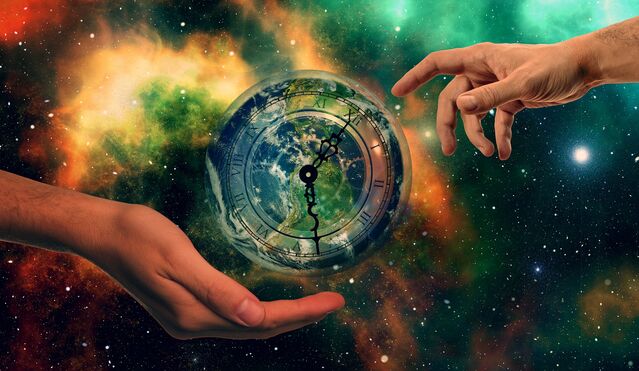
(Source: Gerd Altmann/Pixabay)
A key contrast between time in hindu mythology and western culture emerges in the nature of human existence. In the Abrahamic religions, life is seen as a linear journey: birth, death, and eternity. Although both religious traditions believe in the concept of a soul, the Abrahamic faiths do not accept the transmigration of souls. Time, in their view, was created by God and will end on the day of judgement, beyond which lies eternity.
Commenting on the cultural views on time , British theologian Lesslie Newbigin, emphasises that Eastern religions like Hinduism do not interpret the world through a lens of divine purpose, unlike Christianity. Christian theology often contrasts its goal-oriented perception of time with the cyclical, directionless temporality found in Hindu thought. Christians believe that at the end of time, Jesus Christ will return to deliver the kingdom to God, marking the end of earthly suffering, physical death, and the opportunity for salvation.
Modern-day dichotomies
The divergence between cyclical vs linear time concepts, is rooted deeply in respective religious and philosophical traditions, extending into modern-day practices. As religious beliefs shape broader cultural attitudes toward time, contemporary understandings reflect these underlying differences. Cyclical time in Hindu culture influences not only spiritual concepts but also the more relaxed and fluid approach to time in everyday life, whereas the Linear time in Western society and its goal-oriented view echoes in the structured, punctual nature of Western societies.
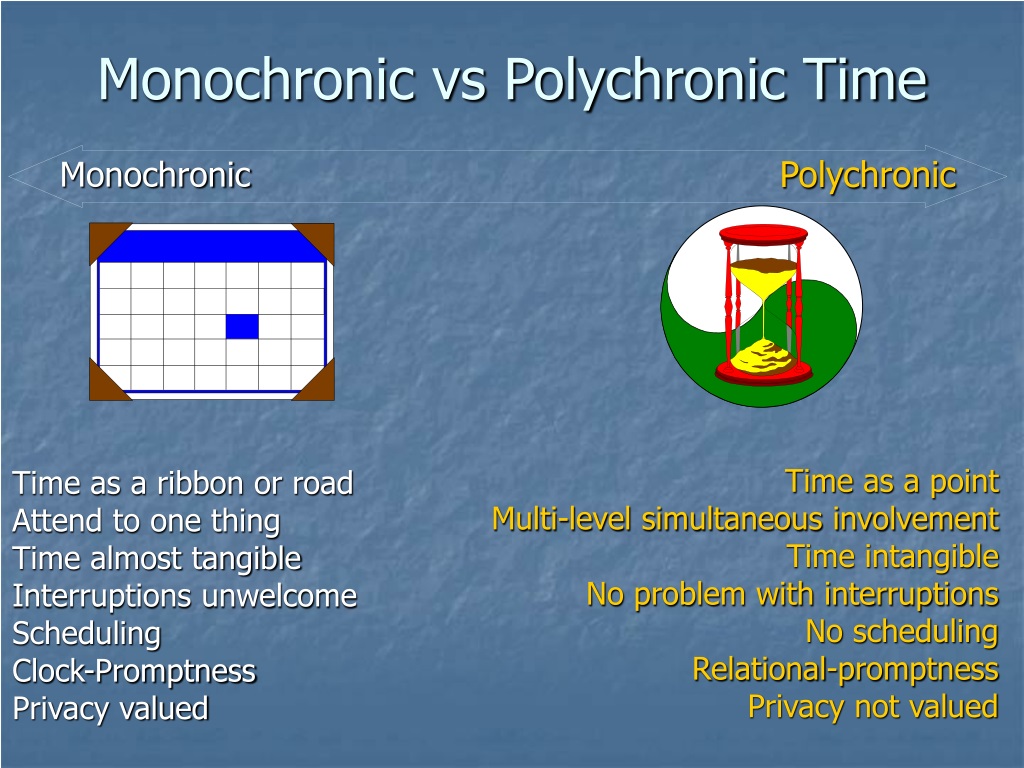
( via Slideserve.com)
This contrast between cultural views on time progression is also evident in modern dichotomies between the cultures. E.T. Hall’s typology distinguishes between monochronic and polychronic cultures. In monochronic cultures, like those of the West, time commitments are taken seriously, deadlines are adhered to strictly, and punctuality is considered essential. Time is seen as linear and separable, emphasising the completion of tasks one by one. Conversely, in polychronic cultures, often found in the East, time commitments are flexible, with a focus on personal involvement and task completion rather than rigid schedules. People in polychronic cultures, where time is viewed as reoccurring, often multitask and shift plans easily, seeing time not as something to be wasted, but as something naturally flowing, where multiple objectives can be achieved simultaneously.
Raimundo Panikkar adds to this by pointing out that modern Hindi uses the same word for both “yesterday” and “tomorrow,” indicating that, in Indian thought, temporal orientation is less about a strict past-future division and more about the relational distance from the present moment. This reinforces the idea of cyclical time in Hindu culture which is not a fixed, linear concept but a flexible and cyclical one.
Convergence of perceptions
The convergence of cultural views on time progression reveals fascinating intersections between Eastern and Western thought. In Christian tradition and western view of time history, it is believed that this faith liberated humanity from the endless cosmological cycles of eternal recurrence, first in late antiquity amidst Hellenistic mystery cults and later in colonial British India, where Christianity encountered classical Hindu thought. Yet, cyclical notions of time have not been absent in the West. Friedrich Nietzsche’s concept of “eternal recurrence” reflects an idea remarkably similar to the Eastern understanding of cyclical time. Nietzsche posited that everything in life repeats perpetually, a notion aligned with the recurring cycles of time in Hindu philosophy.
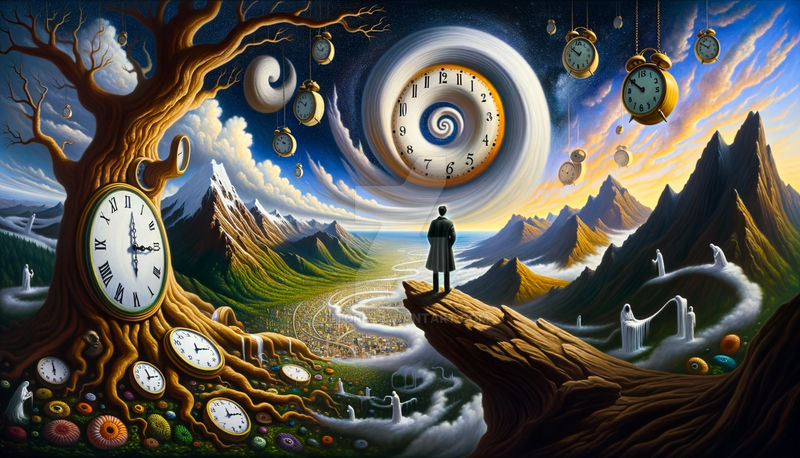
(source – fitore on deviantart.com)
The categories of “cyclical” and “linear” time in Hindu mythology and Western culture however, should not be viewed as rigid opposites. Western philosophy, from Aristotle to Newton, embraced linear time in its “absolute” form, where time exists uniformly for everyone, independent of space. However, Einstein’s theory of relativity transformed this understanding, revealing that time is fluid and changes depending on factors like speed and proximity to massive bodies, such as Earth. In classical India, cyclical and linear perceptions of time also coexisted. While time was viewed cyclically in cosmological speculations, chronologies of kings and historical events followed a more linear progression.
Cross-cultural time perspectives of both Eastern and Western traditions recognize time as a dynamic, ever-changing force that shapes all existence, revealing a shared philosophical value in their respective understandings of cosmos and the time.
References-
Puligandla, R. “Time and History in the Indian Tradition.” *Philosophy East and West*, vol. 24, no. 2, University of Hawai’i Press, Apr. 1974, pp. 165-170.
Coward, Harold. “Time in Hinduism.” Journal of Hindu-Christian Studies 12.1 (1999): 8.
Lone, Javaid Ahmad (alias Javaid Anwar). “Religious Philosophies of Time.” *Research Journal of English Language and Literature (RJELAL)*, vol. 1, no. 3, 2013, pp. 1-5
Barua, Ankur. “Metaphors of Temporality: Revisiting the “Timeless Hinduism” versus “Historical Christianity” Antithesis.” Harvard theological review 104.2 (2011): 147-169.
Sundaram, Mark. “Linear and Cyclical Time: Time’s Arrow or Boomerang?” *Endless Round*, 11 June 2013, https://endlessround.wordpress.com/2013/06/11/cyclical-and-linear-time/.
- Cross-cultural time perspectives
- Cultural views on time progression
- Cyclical time in ancient traditions
- Cyclical time in Hindu culture
- Cyclical vs linear time concepts
- Linear time in Western society
- Temporal concepts in Hindu mythology
- Temporal philosophy in Hinduism
- Time in Hindu mythology and Western culture
- Western view of time history
- September 11, 2024
- 6 Min Read


